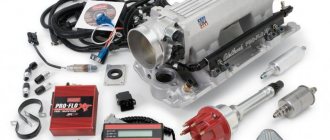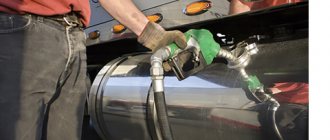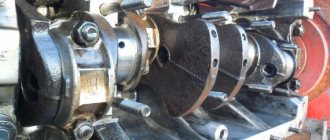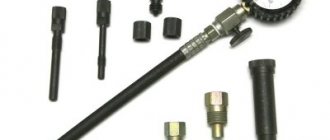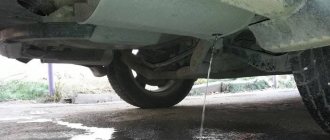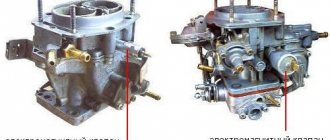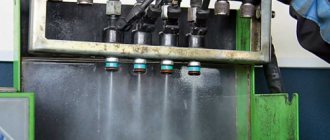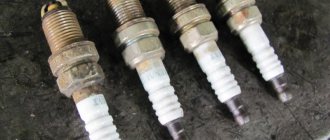Why does the dipstick smell like gasoline?
Many car owners periodically encounter the fact that the oil dipstick smells of gasoline. Since the acuity of smell is different for everyone, knowledgeable car enthusiasts advise performing one simple additional manipulation: move away from the car and try to hold the probe over the flame of a lighter. If the sense of smell does not fail and there are gasoline residues on the dipstick, a small flame will appear, indicating that the fuel vapor has burned out. You can go the other way, without using a lighter: place a drop of oil on a clean sheet of paper with the tip of a dipstick. If there is gasoline, a droplet begins to spread across its diameter, wetting the paper. If there is no gasoline, the oil remains in its original form, its viscosity will not allow the drop to spread and wet the paper base.
Why does my dipstick smell like gasoline?
Possible reasons: mechanical fuel pump is faulty; faulty injectors or faulty piston system. In the first case, the fuel pump is removed and gasoline is pumped manually using the pumping lever. Smudges appearing on the engine wall or a sharply increasing smell of gasoline is evidence that the fuel pump diaphragm has lost its tightness. There are two ways to fix this problem, one of which is quick, but gives a short-term effect, this is adding several layers of cellophane to the diaphragm. And a more reliable option is to replace the fuel pump with a new one.
Faulty injectors.
How to determine whether the injectors are faulty: connect a pressure gauge and check the pressure of the supply system, determine the upper limit and observe changes in the pressure gauge reading for at least five minutes. If the gauge needle moves towards a decrease in the indicator, it means that fuel is coming out through faulty injectors. Start the engine and, as soon as the optimal pressure is built up in the power system, turn off the ignition. Now you can visually determine which of the injectors is faulty (coarsely spraying fuel). Faulty injectors are replaced with new ones or cleaned with a special product, ultrasound (only in service stations). If it is not possible to visually determine the quality of fuel atomization by the injectors, use plastic disposable cups, placing one on each of the injectors. By the smudge on the wall of the cup, you can determine which of the nozzles is malfunctioning and clean it or replace it.
The cause of the smell may be a malfunction of the piston system.
Repairing this problem is the most expensive and difficult. And most often this problem occurs when using low quality oil or fuel. Poor-quality lubricant and fuel products lead to coking of the piston rings, as a result of which fuel evaporates through the gaps formed between the piston and the cylinder walls and enters the oil.
To identify this problem you will need a compression gauge. A compression meter measures the compression of each cylinder. A difference of more than 10% from the standards specified by the manufacturer indicates a malfunction. Coked piston rings are washed with chemicals specially designed for this purpose, after which an oil change is required. In rare cases, flushing does not help, then the engine is disassembled and the faulty pistons are replaced.
see also
Comments 31
Well? Did you figure out the smell?
After that I changed 4 cars, all the dipsticks stink of gasoline)))
I had the same thing on my stamp. It fills quietly, especially in winter with automatic winding
Well, again, from frequent starts in cold weather?
It is possible for gasoline to get into the oil. There are conditions - there must be direct fuel injection, short-term starts and trips. If this is not the case. Then the question is: are there any alarm locks for the injectors? If this is not the case either. Check the compression and sleep well...
I'll measure the compression tomorrow
Campresia has nothing to do with it, well, it’s not connected in any way. You need to look for points of contact between the fuel and the head and crankcase. As for the oil, look at the throttle valve and everything will become clear what’s wrong with it
What exactly will I see in the damper? Is there oil or not?
Oil vapor is possible, but here is the fumes, it kills the engine. It is deposited on the oil scraper rings and also in the idle channels. I myself personally stalled for this reason, the mobile oil had 8000 km, and before replacing it, I personally washed the other valve and did not suspect oil at all. the oil smelled like gasoline, but this smell was more likely just similar; it simply burned, that’s all. Since then I’ve been pouring ADVANT FUEL SYNTHETIC MOBILE, but I take it in Rus' in Moscow since I haven’t had a single comment along the way.
It starts and drives. Well, don't worry. If it breaks, you can fix it and move on)))
Oil vapor is possible, but here is the fumes, it kills the engine. It is deposited on the oil scraper rings and also in the idle channels. I myself personally stalled for this reason, the mobile oil had 8000 km, and before replacing it, I personally washed the other valve and did not suspect oil at all. the oil smelled like gasoline, but this smell was more likely just similar; it simply burned, that’s all. Since then I’ve been pouring ADVANT FUEL SYNTHETIC MOBILE, but I take it in Rus' in Moscow since I haven’t had a single comment along the way.
Well, I recently cleaned the throttle, I don’t think it’s gotten dirty yet. I have smelled about 15 dipsticks already, only one does not smell of gasoline, on a Highlander v6, the rest all smell like mine
MAYBE IT'S JUST WHAT THE OIL SMELLS AFTER ALL THE CURRENTS BURN. CHANGE IT ONCE FOR SOMETHING ELSE AND IT WILL BE CLEAR. TOYOTA 5-40 OR MOBILE ADVENT FUEL SYNTEC 5-30 - PURE AS DEW...:-)
Hello everyone, everything that is said here, sorry chush. Gasoline can only get in one way through the fuel pump, during operation it burns out no matter how much you pour it in, the spark plugs will get stuck and the spark plugs will be black (take it off and look). It’s understandable, but when the engine is running, it will start to evaporate and will definitely end up in the suction manifold due to crankcase gas recirculation, which in turn will lead to unstable operation of the engine. ADVICE TO CHECK THE FORCES FOR LEAKS OR OIL QUALITY.
Original Motul oil purchased from Motul representatives, I’ll check the injectors, but I don’t think they are pouring that much, the consumption is normal
My dipstick is burning oil and the dipstick doesn’t smell like gasoline, but in Kent’s car, on the contrary, it’s not burning oil, but the gasoline smells good and it drives like nothing happens.
Why does the engine oil smell like gasoline: the main reasons
When checking the oil level, I discovered a strange problem: the smell of gasoline was coming from the dipstick. It seems that the oil in the engine cannot smell like gasoline, this is clear to everyone. On the forums they write that the reason should be sought either in burnt-out rings or in injectors that do not close or do not close tightly. But how can that be? They also call a third reason - a malfunction of the fuel pump. Where to start searching, and are there other reasons?
Injection nozzles
In an engine with injectors, the smell of gasoline coming from the dipstick indicates a breakdown of the injectors and ignition system. In the first case, we are talking about the fact that the injectors lose proper tightness. After turning off the engine, fuel, due to residual pressure, seeps into the manifold and from there penetrates the cylinder block. The piston rings serve as a barrier to the crankcase, but if they are worn out, gasoline will still get there.
There is also a smell of gasoline if the ignition system is faulty. If a spark plug breaks, the fuel does not ignite in the cylinder block, that is, it is simply wasted. To fix the problem, you need to remove the fuel rail and check the tightness of all injectors one by one by supplying them with kerosene under pressure. Leaking parts and broken spark plugs need to be replaced with new ones.
Similar articles:
- Oil leak between engine and gearbox: causes and solution to the problem
- Black smoke when starting a cold engine: causes and solution to the problem
- The engine does not develop power - causes and possible solutions to the problem
- The engine does not gain momentum: the cause and solution to the problem
The smell of gasoline in engine oil, where does it come from?
If the engine is an injection engine, then the breakdown of the fuel pump disappears immediately. The engine simply wouldn’t start without it. But injectors can indeed freeze, especially if the gasoline contains water. You can check the cause of burnt-out rings yourself - it will be enough to measure the compression.
Even the dipstick shouldn't smell like gasoline.
The first step is always to look at candles. If black carbon is present, the cause will be one of two things: either the mixture is too rich or it is misfiring. Try to distinguish the first from the second: if the engine “troubles”, you can hear it. In addition, the error with omissions must be diagnosed by the ECU - the Check lamp lights up.
The same thing, but in order
Let's say the Check light really came on. Then we look for error 0300 , 0301-0304 or 1301-1304 .
And then the ignition is diagnosed - we need to look for the cause of the problem, and not just change the spark plug.
Two candles, normal and carbonated
If all the candles are burned equally, then the reason will most likely be a malfunction of the injectors. They can “freeze”: the valve travel will be limited by ice, which always melts as it warms up. Advice - in this case, change the gas station.
Cleaning nozzles and clogging filters - all this does not apply to our case. Here, on the contrary, the mixture turns out to be too rich.
There are known cases when the nozzle did not close completely, but then the engine should smoke... There is nothing wrong with that, by the way - it will start smoking and stop. But the oil will have time to become saturated with harmful fumes.
Engine oil doesn't just smell like gasoline. We need to look for the cause by checking the ignition system and injectors.
Compression as a cause of gasoline smell?
It is unlikely that the compression rings, but not the oil scraper rings, burn out.
Three different rings on the piston
Therefore, it makes sense to perform an initial diagnosis:
- The smell of gasoline may be present in the engine oil, but the oil itself is not consumed or even “arrives.” Conclusion: the rings are not burned out, there is no need to check the compression.
- If both factors are present, that is, the smell of gasoline and oil consumption, then it is too late to take any measurements - burnt-out rings are already making themselves felt.
Nevertheless, in order to assess the level of the problem, in case 2 measurements are taken - a strong deviation from the norm will be detected.
If the deviation does not exceed 5-10%, you don’t have to think about any burnout of the rings. Example: 14.2-15-15.4-15. This is still the “norm”.
It turns out that the initial conclusion is not drawn from the measurement results, but only from observations of the oil level.
Compression test, Nissan Almera
By the way, we considered only injection engines, but not carburetor engines or engines with direct injection.
What are the dangers of mixing fuel with lubricant?
When gasoline gets into the engine oil, it triggers complex reactions that ultimately lead to various breakdowns.
It should be added that everything depends on the volume of fuel that is in the engine oil. If it is small, the motor will work normally for a little longer. However, serious problems will still appear. If there is a large amount of gasoline in the crankcase, this quickly leads to car breakdowns. Consequences of gasoline penetration into oil:
- violation of the fuel correction coefficient. The power unit sometimes cannot be started;
- decreased driving speed, the car has difficulty reaching maximum speed;
- piston failures occur;
- engine failure. This happens when the carburetor or injectors are damaged.
How can you tell if your car has a problem? You need to pay attention to certain signs:
- increased fuel costs. Gasoline is consumed quickly due to the fact that some of it flows into the engine for lubrication;
- strong knocking, noise in the piston system. This is evidence that fuel processing is disrupted;
- engine power decreases, making it more difficult for the car to drive up hills;
- the color of the oil changes;
- The coolant level drops.
What to do if you notice one of the above signs? Go to a car service immediately.
Gasoline enters the crankcase in the following ways:
- Via the main oil pump. The lower area of the pump diaphragm protects the upper area from harmful gas vapors from the crankcase. It is worth checking the condition of the diaphragms sometimes.
- Through a carburetor. This happens if the needle valve is defective. The car is overloaded, which leads to high fuel costs.
To prevent drained fuel from accumulating under the carburetor, it is necessary to remove it through a special drainage tube built into the manifold. If the tube becomes clogged, excess fuel will end up on the engine cylinders. If the temperature is high, they will evaporate almost immediately. When starting the engine coldly in winter, especially in severe frost, fuel will flow along the walls into the crankcase. This will result in the formation of a mixture of gasoline and oil.
It often happens that the driver is unaware of the penetration of fuel into the lubricant until the indicator of high pressure in the oil complex lights up on the instrument panel.
Owners of both foreign cars and Russian cars are aware of the problem of the appearance of the smell of gasoline from motor oil. In a two-stroke power unit, the fuel is a combination of gasoline and lubricant. In a four-stroke engine, these fluids should not come into contact. The oil circulates in a closed manner. If there is a smell of gasoline on the dipstick, it means that the fuel is mixed with the motor oil.
The dipstick smells like gasoline.
Theme Options
Search by topic
I sniffed the dipstick many times and it smelled like oil. The smell of gasoline in the oil is a sign of a dead injection pump (not for the author), dead rings or long attempts to start in the cold (through thermal gaps). One thing is for sure - this oil needs to be changed urgently!
It is very difficult to mix oil and gasoline, and what is the proportion when it runs down the dipstick? 20 liters of gasoline – 5 oil? the smells of gasoline and oil are not at all similar, it seems that someone forgets about volatile aromatic hydrocarbons


